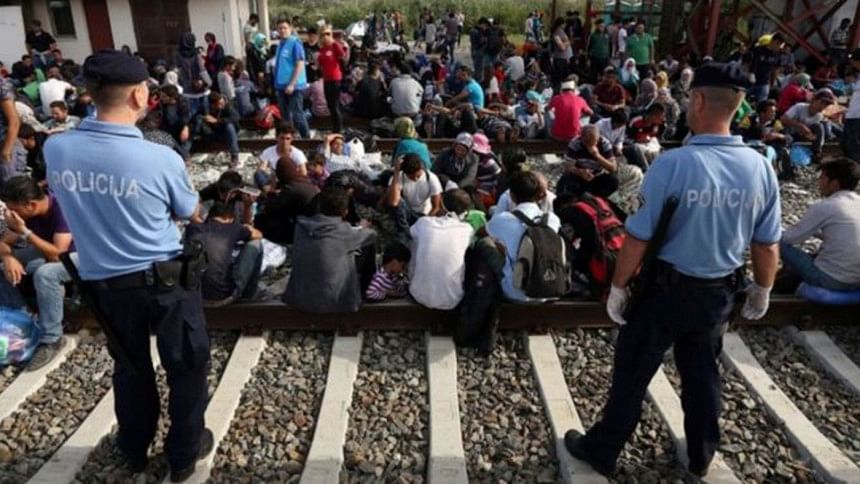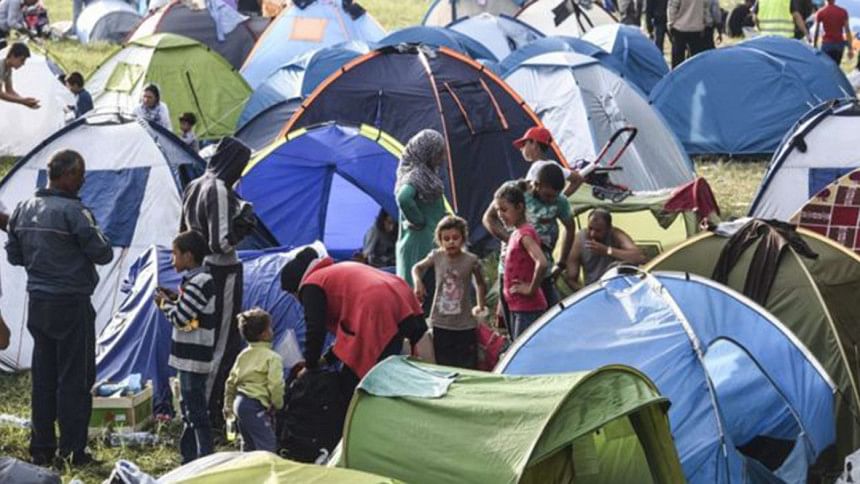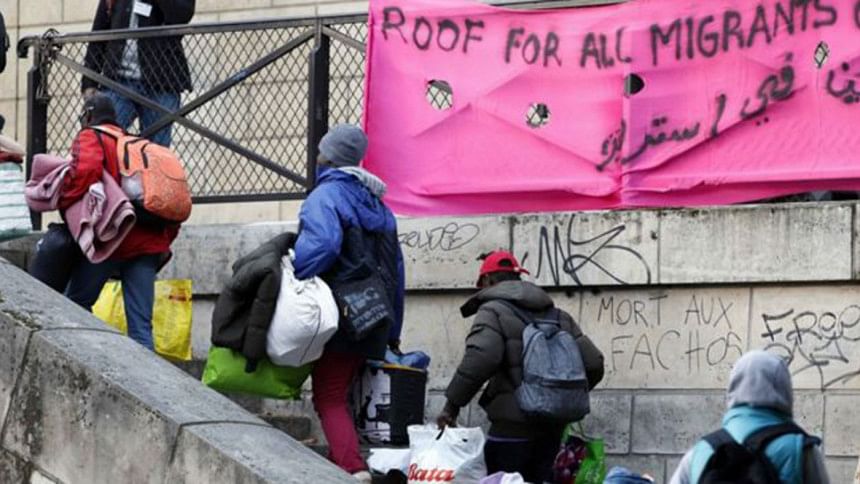Europe migrant influx picks up

Riot police in the Croatian border town of Tovarnik are trying to control crowds of migrants crossing from Serbia, as the EU struggles to deal with the mass movement of people on its southern borders.
More than 6,000 have reportedly so far entered Croatia from Serbia after Hungary closed its border on Tuesday.
Croatia has warned it has limited capacity for migrants.
Hundreds were involved in clashes at the Hungary-Serbia border on Wednesday.
Meanwhile, 7,266 migrants arrived in Germany on Wednesday, twice the number for the previous day.
Many of the migrants are fleeing fighting in Syria, Iraq and Afghanistan and want to reach Germany.
Long queues have formed in Tovarnik as people await buses and trains to reception centres elsewhere in Croatia.
The BBC's Lyse Doucet, at Tovarnik station, says the crowds there - many of them Iranian, Iraqi or Syrian - are angry and frustrated, demanding to know when transport will arrive.
"We want to go!" they are chanting, as a wall of people confront a wall of Croatian riot police.
Some have been waiting a day, she says.
Many migrants in Serbia travelled to the Croatian border after Hungary completed a fence along its border, trying to find a new route through the Balkan countries into northern Europe.
The Croatian Prime Minister, Zoran Milanovic, said that while the migrants were welcome, there was a risk of putting resources under too much strain.
Health Minister Sinisa Varga said Croatia was expecting an estimated 20,000 migrants to arrive in the next two weeks.
Separately on Thursday, the European Parliament backed plans for the mandatory relocation of 120,000 refugees around the EU.

The move comes ahead of a meeting of interior ministers next Tuesday to discuss the measures, and correspondents say it will put pressure on the ministers to give their approval.
Croatia said it would allow migrants to travel into northern Europe, but officials in Slovenia - which borders Croatia to the north - have said they would tighten their border security and would stick to rules which require asylum-seekers to register on arrival.
Slovenia, like Hungary, is an entry point to the borderless European Schengen zone, which normally allows people to travel between member countries without restrictions.
In other developments:
- Germany has extended border controls currently in place with Austria to the Czech Republic
- The head of the German agency in charge of migration and refugees has resigned, citing personal reasons
- Authorities in Paris, France, are evacuating more than 500 migrants from tent camps and offering them accommodation elsewhere
- Bulgaria is sending extra troops to its border with Turkey in case of a further influx of refugees, its defence minister says
- Hundreds of migrants are stranded near the Turkish city of Edirne, close to the border with Bulgaria and Greece
- Austrian railways say services to and from Hungary, suspended on 10 September, will resume on Thursday
'Human shields'
On Wednesday, Hungarian security forces at Horgos, on the Serbian border, clashed with migrants wanting to enter, using tear gas and water cannon to stop them forcing their way in.

In chaotic scenes, police vehicles and ambulances were on the Serbian side of the border, across from massed ranks of Hungarian riot police on the other side.
Some migrants threw missiles, including stones and water bottles.
The firing of tear gas and water cannon created a stampede of migrants away from the border.
UN Secretary General Ban Ki-moon said the police tactics were "unacceptable".
Hungary closed its entire border with Serbia on Tuesday after making it illegal to enter the country or damage the border fence. The country's courts have started fast-track trials of arrested migrants.
Hungarian media split on border incident
The clashes at the Roszke-Horgos border crossing divide pro-government and opposition newspapers.
Centre-right Magyar Nemzet says: "The Hungarian border was besieged by those who think that it's their basic human right to march throughout Europe without papers." A paper launched recently by the ruling Fidesz party argues the "determination and aggressiveness" of the migrants left Hungarian police with little choice but to use water-cannon.
But centre-left Nepszabadsag reacts sarcastically that "the strong Hungarian nation can breathe freely... We no longer have anything to worry about". And a commentator in centre-left Nepszava remarks: "We can now get on with our everyday Hungarian lives surrounded by barbed wire and shunned by migrants, neighbours, brothers, pals, close friends and investors."

 For all latest news, follow The Daily Star's Google News channel.
For all latest news, follow The Daily Star's Google News channel. 



Comments